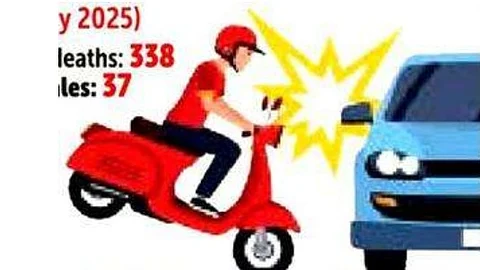

Goa has recorded an average of 20 deaths per month from head injuries between January 2024 and May 2025, placing the state at the top of the national chart for such fatalities relative to its population, according to one of India’s leading neurosurgeons, Dr Vernon Velho.
“Given Goa’s population and demography, it is now the capital of head injuries,” said Dr Velho, Head of the Department of Neurosurgery at JJ Hospital, Mumbai. “Despite having one of the highest literacy rates in the country, Goa is seeing a worsening trend in head trauma deaths. Helmets for pillion riders must be made mandatory and strictly enforced.”
A total of 338 people died of head injuries during this 17-month period, with 301 male and 37 female victims, as per records from the Forensic Department of Goa Medical College (GMC). Dr Ponraj K Sundaram, Head of Neurosurgery at GMC, attributed nearly 80% of these accidents to alcohol consumption and driving, and over half to non-usage of helmets — especially among pillion riders. “Using mobile phones while riding, not wearing seat belts, and general disregard for safety are major contributors. Neurosurgery can save lives, but it cannot reverse brain damage. Prevention is the only cure,” Dr Sundaram cautioned.
Though laws mandate both rider and pillion to wear helmets, implementation remains lax in Goa. While more riders have started wearing helmets, most pillion riders continue to ignore the law — enabled by weak enforcement.
“I admit we’ve been lax on ensuring helmet use among pillion riders. But we are taking the issue seriously and will act immediately to strengthen enforcement,” said Director of Transport, Pravimal Abhishek (IAS).
However, the Goa Police say they are waiting on a formal notification from the Transport Department. “As per the law, helmets are compulsory for both rider and pillion, but no specific notification has been issued for enforcing it on pillion riders,” said Superintendent of Police (Traffic), Probodh Shirvoikar.
Total head injury deaths:338
Males:301Females:37
Average deaths per month:20
Deaths in May 2024 and May 2025 (each):30
“Without a notification, enforcement becomes tricky. Still, we do try to persuade pillion riders to wear helmets,” he added.
The irreversible nature of brain injury adds urgency to the crisis. “Brain damage is permanent. Unlike the liver or other organs, brain tissue does not regenerate. Victims of traumatic brain injury often face lifelong disability,” explained Dr Sundaram.
Figures show that 30 deaths due to head injury were reported in both May 2024 and May 2025 alone. “People who wish to drink should be responsible enough not to endanger others. Reckless mobile phone use and not wearing seat belts in four-wheelers worsen the situation,” Dr Sundaram added.
Though traffic police conduct random checks and issue fines for helmetless riding and non-use of seat belts, enforcement gaps remain. Shirvoikar had no clear answer on why seat belt rules are not strictly followed by all car occupants.
“Deaths from head injuries now outnumber those from heart disease in Goa,” warned Dr Andre V Fernandes, Head of Forensic Medicine at GMC. “This is far too serious an issue for authorities to pass the buck.”
Outside GMC’s neurosurgery Outpatient Department, Ismelda (name changed) sits with her 34-year-old son, a motorbike accident victim. Four months after the crash, he still stares blankly, occasionally breaking into a vacant smile.
“He hasn’t returned to work, and we’re unsure if he ever will,” she said. “We visit the hospital every other week. With a wife and daughter depending on him, prayer is all that keeps me going.”